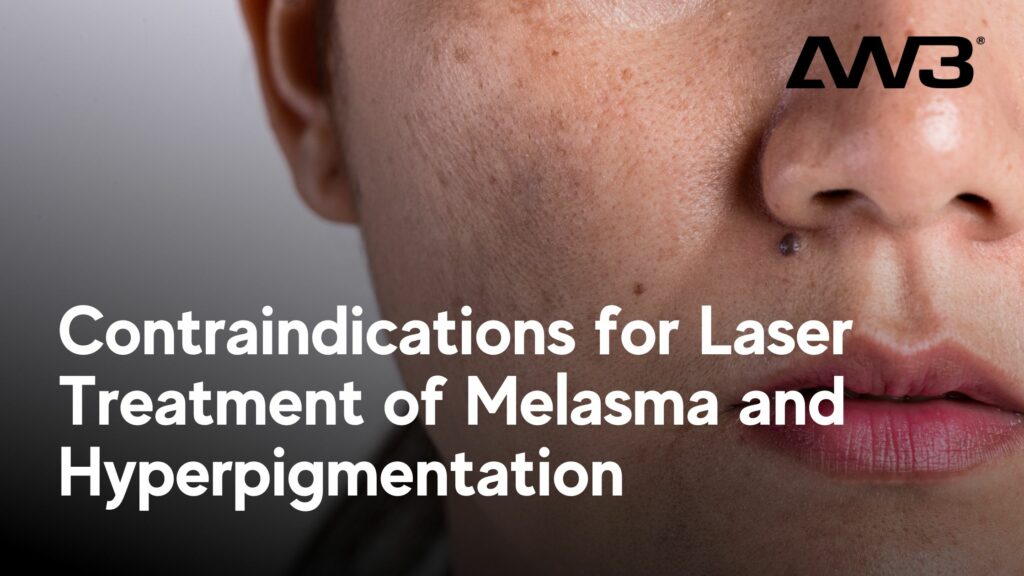Laser treatments are highly effective for managing melasma and hyperpigmentation, offering a solution for reducing dark patches and achieving a more even skin tone. However, not everyone is a suitable candidate for these treatments. Understanding the contraindications is crucial to ensure safety and effectiveness. In this blog, we’ll explore the contraindications for laser treatment of melasma and hyperpigmentation and guide who should avoid these procedures.
What is contraindications?
Contraindications are specific situations or conditions that indicate a particular treatment, procedure, or medication should not be used because it could be harmful to the person. For example, if someone is allergic to a certain medication, taking it could cause a severe allergic reaction, making the allergy a contraindication.
Similarly, if a person has a medical condition like heart disease, certain treatments or medications might worsen their condition, so heart disease would be a contraindication for those treatments.
During pregnancy, some medications or procedures can harm the developing baby, so pregnancy is often a contraindication for those treatments. In essence, contraindications are the “red flags” that alert doctors and patients when something should not be used because it might pose a risk to the individual’s health.
Contraindications for Melasma Treatment
1. Active Skin Infections:
- Reason: Lasers can exacerbate existing skin infections and may lead to complications.
- Recommendation: Ensure all infections are fully resolved before undergoing treatment.
2. Recent Sun Exposure or Tanning:
- Reason: Recent sun exposure or tanning can increase the risk of adverse reactions and complications, such as hyperpigmentation or burns.
- Recommendation: Avoid sun exposure and tanning beds for at least 4-6 weeks prior to treatment.
3. Pregnancy and Breastfeeding:
- Reason: The safety of laser treatments during pregnancy and breastfeeding is not well-established.
- Recommendation: It is generally advised to postpone treatments until after breastfeeding and pregnancy.
4. Use of Certain Medications:
- Reason: Medications that increase photosensitivity (e.g., certain antibiotics, antihistamines) can lead to adverse reactions.
- Recommendation: Inform your provider about all medications and supplements you are taking.
5. Dark Skin Tones:
- Reason: Individuals with darker skin tones may be at a higher risk for post-inflammatory hyperpigmentation or burns.
- Recommendation: Consult with a specialist experienced in treating darker skin tones and use appropriate laser settings.
6. Active Skin Conditions (e.g., eczema, psoriasis):
- Reason: Active skin conditions can interfere with healing and increase the risk of complications.
- Recommendation: Treat underlying skin conditions before considering laser treatments.
Contraindications for Hyperpigmentation Treatment
1. Recent Chemical Peels or Microdermabrasion:
- Reason: Recent treatments can make the skin more sensitive and prone to adverse reactions.
- Recommendation: Wait until the skin has fully healed from any recent exfoliating procedures.
2. History of Keloid Scarring:
- Reason: Individuals prone to keloid scarring may experience increased risk of developing keloids after laser treatment.
- Recommendation: Discuss your scarring history with your provider to evaluate risk.
3. Uncontrolled Medical Conditions (e.g., diabetes):
- Reason: Uncontrolled medical conditions can affect healing and treatment outcomes.
- Recommendation: Ensure that any medical conditions are well-managed before proceeding with treatment.
4. History of Photosensitivity Reactions:
- Reason: Individuals with a history of photosensitivity may have adverse reactions to laser treatments.
- Recommendation: Avoid laser treatments if you have a history of severe photosensitivity reactions.
5. Allergies to Laser Treatment Components:
- Reason: Allergic reactions to components used during the procedure can cause complications.
- Recommendation: Inform your provider of any known allergies to ensure appropriate precautions.
You need to understand the contraindications of laser treatments for melasma and hyperpigmentation, which is essential for ensuring safety and achieving the best results. If you have any of the conditions listed above, consult with a qualified provider to explore alternative treatment options or determine the suitability of laser therapy for your specific needs.
For personalized advice and expert care, find an AW3® provider near you on our Find a Provider page.




